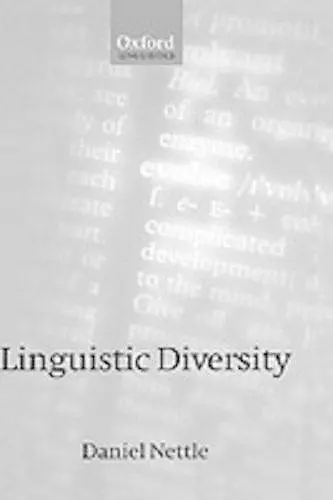Linguistic Diversity
Format:Hardback
Publisher:Oxford University Press
Published:6th May '99
Currently unavailable, and unfortunately no date known when it will be back
This hardback is available in another edition too:
- Paperback£46.49(9780198238577)

There are some 6,500 different languages in the world, belonging to around 250 distinct families and conforming to numerous grammatical types. This book explains why. Given that the biological mechanisms underlying language are the same in all normal human beings, would we not be a more successful species if we spoke one language? Daniel Nettle considers how this extraordinary and rich diversity arose, how it relates to the nature of language, cognition, and culture, and how it is linked with the main patterns of human geography and history. Human languages and language families are not distributed evenly: there are relatively few in Eurasia compared to the profusion found in Australasia, the Pacific, and the Americas. There is also a marked correlation between biodiversity and linguistic diversity. The author explains the processes by which this distribution evolved and changes still. To do so he returns to the earliest origins of language, reconstructing the processes of linguistic variation and diffusion that occurred when humans first filled the continents and, thousands of years later, turned to agriculture. He ends by examining the causes of linguistic mortality, and why the number of the world's languages may halve before 2100. Linguistic Diversity draws on work in anthropology, linguistics, geography, archaeology, and evolutionary science to provide a comprehensive account of the patterns of linguistic diversity. It is written in a clear, lively and accessible style, and will appeal broadly across the natural and human sciences, as well as to the informed general reader.
This volume represents the synthesis of a bewildering amount of information and theory in numerous disciplines. * The Journal of The Royal Anthropological Institute *
Nettle has produced a careful, thoughtful, and valuable study. He is to be commended for being unafraid to challenge the shibboleth that biological and linguistic diversity are wholly unrelated. He substantially adds to our knowledge of why languages have come to be distributed the way they are. * Language Policy *
Nettle makes an important contribution to our understanding of reasons for the variation in the number of languages by correlating economic factors of subsistence with linguistic diversity. * Language Policy *
A panopoly of possible microprocesses of language variation are explored painstakingly and with great ingenuity by the author ... This book is a mine of geolinguistic and sociolinguistic data, presented in a plain and captivating style. * TREE *
His conclusions ... are eminently reasonable and manage to tie together a number of strands of thought in an original and creative way ... a valuable contribution to our understanding of how and why languages have changed over time. * Journal of Linguistics *
ISBN: 9780198238584
Dimensions: 242mm x 161mm x 15mm
Weight: 412g
180 pages